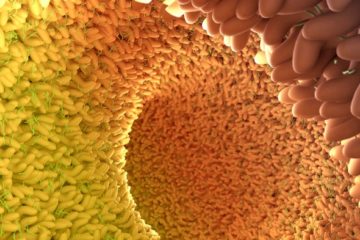Melinday Moyer in Scientific American:
 The body’s constellation of gut bacteria has been linked with various aging-associated illnesses, including cardiovascular disease and type 2 diabetes. Now a study has found that aging itself is associated with microbiome changes, and that these alterations are distinct from those connected to diseases or medication use. The findings raise the possibility that shifts in gut bacteria help drive the aging process—and that protecting these microbes could help people lead longer, healthier lives.
The body’s constellation of gut bacteria has been linked with various aging-associated illnesses, including cardiovascular disease and type 2 diabetes. Now a study has found that aging itself is associated with microbiome changes, and that these alterations are distinct from those connected to diseases or medication use. The findings raise the possibility that shifts in gut bacteria help drive the aging process—and that protecting these microbes could help people lead longer, healthier lives.
In the new study, published in Cell Reports on September 28, researchers at Cedars-Sinai Medical Center in Los Angeles sampled bacteria from the small intestines of 251 people between the ages of 18 and 80 who were undergoing upper endoscopies, when a doctor sticks a small probe down the throat and past the stomach. Usually, researchers study gut bacteria through stool samples. But those microbes, coming from the very end of the bowel, can be quite different from bacteria in the small intestine, closer to the stomach. That’s where most digestion and nutrient absorption occurs. “All the magic happens in the small intestine,” says study co-author Mark Pimentel, a gastroenterologist at Cedars-Sinai.
After analyzing the samples, the researchers found that aging was linked with changes in bacterial populations. Older people had more bacteria from the families Enterococcaceae, Lactobacillaceae, Enterobacteriaceae and genus Bacteroides, “and those are all groups of bacteria that can cause disease in humans,” says Heidi J. Zapata, an infectious disease specialist and immunologist at the Yale School of Medicine, who was not involved in the study. E. coli bacteria, which belong to the Enterococcaceae family, for instance, can cause diarrhea and urinary tract infections. Overall bacteria diversity also declined as people got older, going down as people headed towards age 80. Low diversity has been linked to health problems too, Pimentel says. Studies have found a relationship between low bacterial diversity and Crohn’s disease, irritable bowel syndrome and colorectal cancer, among other conditions.
More here.
